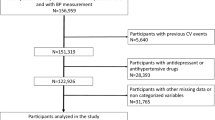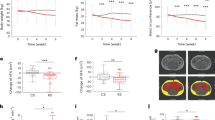Abstract
Objective:
To examine levels of eating disorder behaviours and cognitions of young women with obesity in the Australian Capital Territory, Australia and assess the impact upon psychological status.
Design:
General population cross-sectional survey.
Subjects:
A total of 4891 young women from the community aged 18–42 years, of which 630 were in the obese weight range.
Measurements:
Body mass index (BMI), eating disorder psychopathology (eating disorder examination questionnaire), and psychological distress (K-10).
Results:
Women with obesity had significantly higher levels of dietary restraint, eating concern, weight concern, shape concern, binge eating, misuse of diuretics, use of diet pills and fasting compared to other women in the community. These eating disorder cognitions and behaviours were associated with increased levels of psychological distress. In women with obesity, eating concern, weight concern, shape concern, dietary restraint and decreased age predicted psychological distress in a multivariate model. Among other women in the community, behaviours such as laxative misuse, ‘hard’ exercise and subjective bulimic episodes also contributed to the model predicting psychological distress.
Conclusion:
As disordered eating psychopathology is high in young obese women and negatively impacts upon psychological status, obesity prevention and treatment should consider eating disorder psychopathology and mental health outcomes.
This is a preview of subscription content, access via your institution
Access options
Subscribe to this journal
Receive 12 print issues and online access
$259.00 per year
only $21.58 per issue
Buy this article
- Purchase on Springer Link
- Instant access to full article PDF
Prices may be subject to local taxes which are calculated during checkout
Similar content being viewed by others
References
Australian Bureau of Statistics (ABS). Health risk factors in Australia 2001,Cat.no. 2812.0. ABS: Canberra Australia, 2003.
Aalto-Setala T, Matrunnen M, Tuulio-Henriksson A, Poikolainen K, Lonnqvist J . One-month prevalence of depression and other DSM-IV disorders among young adults. Psychol Med 2001; 31: 791–801.
Ghaderi A, Scott B . Prevalence, incidence and prospective risk factors for eating disorders. Acta Psychol Scand 2001; 104: 122–130.
Hay PJ . The epidemiology of eating disorder behaviours: An Australian community-based survey. Int J Eat Disorder 1998; 23: 371–382.
Pawluck DE, Gorey, KM . Secular trends in the incidence of anorexia nervosa. Int J Eat Disorder 1998; 23: 347–352.
Keel PK, Haedt A, Edler C . Purging disorder: an ominous variant of bulimia nervosa? Int J Eat Disorder 2005; 38: 191–199.
Pearlstein T . Eating disorders and comorbidity. Archive of Womens Mental Health 2002; 4: 67–78.
Wardle J, Waller J, Ropoprt L . Body dissatisfaction and binge eating in obese women: role of restraint and depression. Obes Res 2001; 9: 778–787.
Schwartz M, Brownell K . Obesity and body image. Body image 2004; 1: 43–56.
Vander Wal JS, Thelen MH . Eating and body image concerns among obese and average weight children. Addictive Behaviours 2000; 25: 775–778.
Ikeda JP, Lyons P, Schawartzman F, Mitchell RA . Self reported dieting experiences of women with body mass indexes of 30 or more. J Am Diet Asso 2004; 104: 972–974.
Broberg AG, Hjalmers I, Nevonen L . Eating disorders, attachment and interpersonal difficulties: A comparison between 18 to 24 year old patients and normal controls. Eur Eat Disord Rev 2001; 9: 381–396.
Wabitsch M . Overweight and obesity in European children: definition and diagnostic procedures, risk factors and consequences for later health outcome. Eur J Pediatr 2000; 159 (suppl): S8–S13.
Graci S, Izzo G, Saviono S, Cattani L, Lezzi G, Berselli ME et al. Weight cycling and cardiovascular risk factors in obesity. Int J Obes 2004; 28: 65–71.
Friedman KE, Reichmann SK, Costanzo PR, Musante G . Body image partially mediates the relationship between obesity and psychological distress. Obes Res 2002; 10: 33–41.
Wadden T, Phelan S . Assessment of quality of life in obese individuals. Obes Res 2002; 10 Supplementary: 50S–57S.
Onyike CU, Crum RM, Lee HB, Lyketsos CG, Eaton WW . Is obesity associated with major depression? Results from the third national health and nutrition examination survey. Am J Epidemiol 2003; 158: 1139–1147.
Hill AJ, Williams J . Psychological health in a non-clinical sample of obese women. Int J Obes 1998; 22: 578–583.
Musante GJ, Costanso PR, Friedman KE . The comorbidity of depression and eating dysregulation processes in a diet-seeking obese population: a matter of gender specificity. Int J Eat Disorder 1998; 23: 65–75.
Hsu LKG, Mulliken B, McDonagh B, Krupa Das S, Rand W, Fairburn CG et al. Binge eating disorder in extreme obesity. Int J Obes 2002; 26: 1398–1403.
Pinaquy S, Chabrol H, Simon C, Louvet JP, Barbe P . Emotional eating, alexithymia and binge-eating disorder in obese women. Obes Res 2003; 11: 195–201.
Sanchéz-Johnsen LAP, Dymek M, Alverdy J, Grange DL . Binge eating and eating related cognitions and behaviour in ethnically diverse obese women. Obe Res 2003; 11: 1002–1009.
Jackson TD, Grilo CM, Masheb RM . Teasing history, onset of obesity, current eating disorder psychopathology, body dissatisfaction and psychological functioning in binge eating disorder. Obes Res 2000; 8: 451–458.
Nauta H, Hospers HJ, Jansen A, Kok G . Cognitions in obese binge eaters and obese non binge eaters. Cognitive Ther Res 2000; 24: 521–531.
Mitchell JE, Mussell MP . Comorbidity and binge eating disorder. Addictive Behaviours 1995; 20: 725–732.
Yanovski SZ, Nelson JE, Dubbert BK, Spitzer RL . Association of binge eating disorder and psychiatric comorbidity in obese subjects. Am J Psychiat 1993; 150: 1472–1479.
Yanovski SZ . Binge eating disorder and obesity in 2003: could treating and eating disorder have a positive effect on the obesity epidemic? Int J Eat Disorder 2003; 34: S117–S120.
Mond JM, Hay PJ, Rodgers B, Owen C . Eating Disorder Examination Questionnaire (EDE-Q): norms for young adult women. Behav Res Ther 2006; 44: 53–62.
Mond JM, Hay PJ, Rodgers B, Owen C, Beumont PJV . Validity of the eating disorder examination questionnaire (EDE-Q) in screening for eating disorders in community samples. Behav Res Ther 2004; 42: 551–567.
National health and medical research. Clinical practice guidelines for the management of overweight and obesity in adults. Commonwealth of Australia: Canberra, 2003.
Beglin SJ, Fairburn CG . Evaluation of a new instrument for the detection of eating disorders. Psychiat Res 1992; 44: 191–201.
Fairburn CG, Cooper Z . The eating disorder examination. In: Fairburn CG, Wilson GT (eds). Binge Eating: Nature Assessment and Treatment, 12th ed. Guilford Press: New York, 1993, pp 317–360.
Mond JM, Hay PJ, Rodgers B, Owen C, Beumont PJV . Temporal stability of the eating disorder examination questionnaire (EDE-Q). Int J Eat Disorder 2004; 36: 195–203.
Andrews G, Slade T . Interpreting scores on the Kessler Psychological Distress Scale. Aust NZ J Publ Heal 2001; 25: 494–497.
Mond JM, Hay PJ, Rodgers B, Owen C, Beumont PJV . Assessing quality of life in eating disorder patients. Qual Life Res 2005; 14: 171–178.
Stunkard AJ, Sorensen TIA . Obesity and socioeconomic status-a complex relationship. New Engl J Med 1993; 329: 1036–1037.
Fairburn CG, Harrison PJ . Eating Disorders. Lancet 2003; 361: 407–416.
Minniti A, Bissoli L, Di Francesco V, Olivieri M, Mandragona R, Mazzali G et al. The relationship between body image and quality of life in treatment seeking overweight women. Eating and Weight Disorders 2004; 9: 206–210.
De Zwann M, Mitchell JE, Howell M, Monson N, Swan-Kremeier L, Roerig JL et al. Two measures of health related quality of life in morbid obesity. Obes Res 2002; 10: 1143–1151.
Shaw K, O'Rourke P, Del Mar C, Kenardy J . Psychological interventions for overweight or obesity. Cochrane Database Sys Rev 2005; Issue 2. Art. No.: CD003818. DOI:10.1002/14651858.CD003818.pub2.
Hay PJ, Bacaltchuk J, Stefano S . Psychotherapy for bulimia nervosa and binging. Cochrane Database Sys Rev 2004; Issue 3. Art. No.: CD000562. DOI:10.1002/14651858.CD000562.pub2.
Acknowledgements
This research was assisted with funding from the NSW Institute of Psychiatry in the form of a research training fellowship for Jonathan Mond. A funding grant was also received from the Australian Capital Territory Department of Health and Community Care.
Author information
Authors and Affiliations
Corresponding author
Rights and permissions
About this article
Cite this article
Darby, A., Hay, P., Mond, J. et al. Disordered eating behaviours and cognitions in young women with obesity: relationship with psychological status. Int J Obes 31, 876–882 (2007). https://doi.org/10.1038/sj.ijo.0803501
Received:
Revised:
Accepted:
Published:
Issue Date:
DOI: https://doi.org/10.1038/sj.ijo.0803501
Keywords
This article is cited by
-
From one end of the scale to the other: overweight and obese individuals’ experiences with anorexic attitudes, cognitions, and behaviours
Discover Psychology (2023)
-
Exploring eating and exercise-related indicators during COVID-19 quarantine in Portugal: concerns and routine changes in women with different BMI
Eating and Weight Disorders - Studies on Anorexia, Bulimia and Obesity (2022)
-
The relationship between body weight and dietary restraint is explained by body dissatisfaction and body image inflexibility among young adults in China
Eating and Weight Disorders - Studies on Anorexia, Bulimia and Obesity (2021)
-
Elucidating knowledge and beliefs about obesity and eating disorders among key stakeholders: paving the way for an integrated approach to health promotion
BMC Public Health (2019)
-
Association between hedonic hunger and body-mass index versus obesity status
Scientific Reports (2018)



